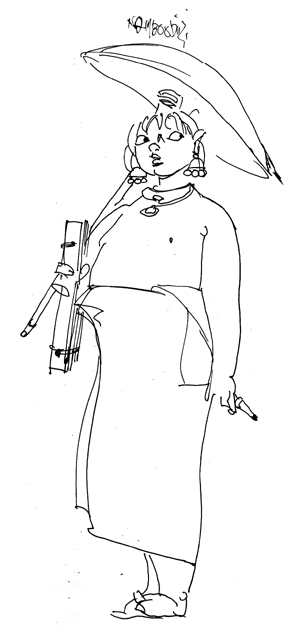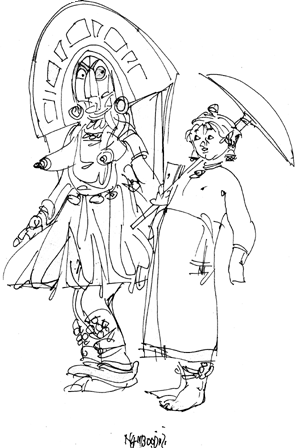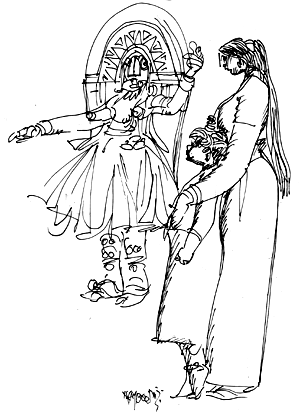|
Poet,
Playwright and Social Activist
Born: In Kuttippuram in Kerala on 23rd December, 1906
Died: On 16th October, 1974 Awards
Bestowed on Edasseri Govindan Nair:
Government of Madras Award for the play
"KOOTTUKRISHI"
Government of Madras Award for the collection of poems
"PUTHAN
KALAVUM
ARIVALUM"
Kerala
Sahitya Akademi Award for the collection of poems
"ORU PIDI
NELLIKKA" - 1969
Sahitya
Akademi Award (New Delhi) for the collection of poems
''KAVILE
PATTU" - 1970
Kumaran
Asan Prize (posthumously given) for the collection of poems
"ANTHITHIRI" - 1979 Positions Held By
Edasseri Govindan Nair:
President of Kendra
Kala Samithi
Founder of Krishna
Panikker Memorial Reading Room
Member of the board
of directors of Sahitya Pravarthaka Sahakarana Sangham
(Writers'
Co-operative Publishing House)
Member of the general
council of Kerala Sahitya Akademi
Member of the
Sangeetha Nataka Akademi
Member of the
Samastha Kerala Sahitya Parishad
President of
Kerala Sahitya Samithy
Apart from the above he was the organizer of various writers’
movements and literary symposia and was an inspiration to the new
generation of writers in Kerala.
See also page:
Recital of Edasseri
poems on this site.
Malayalam Poet And
Playwright
Born in Kuttippuram, a quiet village
15 kilometers off Ponani, a coastal town of Kerala in South India,
Edasseri Govindan Nair, is considered foremost in the array of poets,
who led Malayalam Poetry to the fascinating vistas of modernism and
social awareness. His work epitomizes the culture of Kerala resplendent
in both archaic myths and modern life. His poems visit "the good,
the bad and the ugly" of the development paradigm of modern Kerala.
The poems resonate with patriotism and a profound appreciation of Indian
freedom struggle, but are critical of the style of political parties
post-independence. His plays portray the ideals of equality and social
amity cherished by the revolutionary youth of his time. The contribution
made by Edasseri to the Kerala's amateur stage both as a playwright and
as a missionary of people's appreciation of drama has been seminal to
the development of a modern stage sensibility.
The bard of the heroic motherhood
In his poem Poothappattu (Song About the Pootham -
"Pootham" is a folklore idol) he has woven a myth to
creatively interpret the folklore dancer who makes appearance on every
courtyard after the harvest season dancing to the accompaniments of drum
and cymbal. In "Poothappattu" as also in the later poem "Kavile
Pattu", Edasseri has illustrated the power of motherhood that turns
a ferocious blood-thirsty deity into one of love and peace. He has also
written a number of poems on Lord Krishna in a perspective that is
totally different from the collective mind.
A poet of new humanism
Edasseri dealt with an awe-inspiring variety of
subjects in his poems, plays and essays. His subjects range from the
mythical to the social psyche on the one hand and from socio-political
to environmental concerns on the other. Thus the oracle in "Kavileppattu"
(The Song of the Divine Grove) bleeds his forehead with a sickle shaped
sword during the temple festivals. The ritual - the self infliction of
pain - is spiritually similar to the Christian sense of sacrifice,
carrying the cross for others' sins so as to appeal to their conscience.
In his poem written during the pre-land reform days, the downtrodden
farmer pays a heavy price for his inability to keep the commitment to
his landlord because of crop failure. The landlord attaches his crop
pushing him to misery and hunger. The poem concludes with the farmer's
realization that political empowerment is the sine qua non for his
liberation. At a time when pro-labour laws were non-existent he sung
empathizing with the poor women labourers who languished in the coir
factories, about the workers who were driven to poverty and death
consequent to lock-outs in factories. His poems, along with those of
other progressive writers, heralded the legal reforms in the Kerala
labour scene and indeed resonated the social upheavals taking place at
that time. Clearly Edasseri became the fountainhead of new humanism in
Kerala.
A farsighted environmentalist Edasseri is the first
poet in Kerala to air concern about the damage to eco system, in two of
his poems "Kuttippuram Bridge"(1954) and "The Mango Tree
Felled" (1963), when ecology was still not a subject of human
concern at least in this part of the world. New poets have evoked such
keen interest as Edasseri in the new-era writers, so much so about
twenty five poets have written poems eulogizing him. A collection of
their poems on Edasseri has been published by Mathrubhumi Books, Kozhikode.
The title of the collection is Edasseri Ninavil Varumbol.
  
|